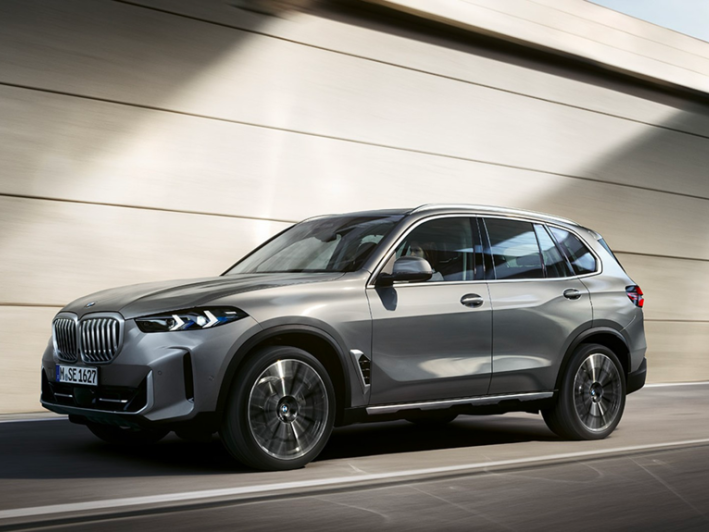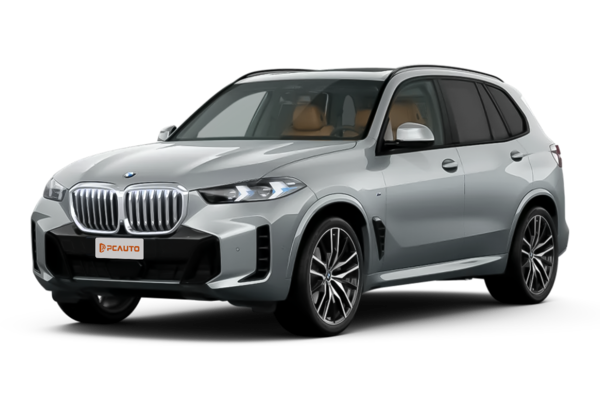Q
What is the difference between BMW X5 2020 and 2024?
The key differences between the 2020 and 2024 BMW X5 lie in upgrades to tech features, powertrains, and design details. The 2024 model gets the new iDrive 8.5 system with a curved dual-screen setup and a smarter voice assistant, while the 2020 still runs iDrive 7 with a traditional center console layout. Under the hood, the 2024 xDrive40i's 3.0L inline-six gains a 48V mild hybrid system, cutting fuel consumption by around 8%. The plug-in hybrid xDrive50e now offers 80 km of electric range (WLTP), a big jump from the 2020 xDrive45e's 54 km. Externally, the 2024 X5 tweaks the laser headlight shape and grille contours, while inside, the traditional gear shifter is replaced with a crystal-finish unit. Notably, the 2024 model beefs up driver assistance with new traffic light recognition and automatic lane change assist—features that were optional on the 2020. For used car shoppers, keep an eye out for common 2020 issues like valve cover gasket leaks and air suspension problems, whereas 2024 owners should monitor OTA update performance for the infotainment system. Both generations maintain BMW's classic handling feel, but the 2024 improves further by reducing unsprung weight through chassis material upgrades.
Special Disclaimer: This content is published by users and does not represent the views or position of PCauto.
Related Q&A
Q
Should I buy a 2019 BMW X5?
The 2019 BMW X5 is a well-rounded premium SUV that delivers an excellent driving experience for those who value performance and luxury. Its 3.0-liter turbocharged inline-six engine packs plenty of punch, paired with a smooth-shifting 8-speed automatic transmission that balances responsiveness and decent fuel efficiency. The xDrive all-wheel-drive system also provides confident handling on slippery roads.
Inside, the X5 boasts high-quality materials and plenty of tech, including a 12.3-inch infotainment screen, digital instrument cluster, and support for both Apple CarPlay and Android Auto—making it highly practical. Rear legroom is generous, and the cargo space is more than enough for family needs.
That said, maintenance and repair costs are higher than mainstream brands, especially for genuine parts and labor. It’s worth checking local service center pricing and reputation before buying. On the used market, condition varies widely—always look for a full service history and get a professional inspection to avoid hidden flood or accident damage.
If your budget allows, cross-shop it with rivals like the Mercedes-Benz GLE (softer ride, more comfort-focused) or Audi Q7 (cutting-edge tech features). Ultimately, the best choice depends on your priorities and driving preferences.
Q
How many miles will a 2019 BMW X5 last?
The durability of a 2019 BMW X5 largely depends on maintenance, driving habits, and operating conditions. Under normal circumstances, this model can last between 200,000 to 300,000 kilometers—or even more—provided it receives regular upkeep like oil changes, transmission servicing, and brake system inspections.
The turbocharged engine and 8-speed automatic transmission in the X5 are proven technologies. As long as wear-and-tear parts like the timing chain and spark plugs are replaced on schedule, the mechanical components should remain reliable. That said, German luxury cars have complex electronics, so pay extra attention to the battery health and sensor maintenance, especially in tropical climates where cooling system efficiency is critical.
For used-car buyers, prioritize checking the condition of the chassis rubber bushings and any signs of engine oil leaks—these details reveal more about the vehicle’s true state. Among its peers, an X5 maintained with genuine OEM parts typically outlasts those using aftermarket components and holds better resale value. If you plan to keep it long-term, stick to the manufacturer’s maintenance recommendations.
Q
What is the maintenance cost for a 2019 X5?
As a luxury SUV, the maintenance costs for the 2019 X5 can vary depending on mileage and driving conditions. Routine services like oil and filter changes typically run between RM800 to RM1,200. For major services—such as brake fluid, transmission fluid, or air filter replacements—the cost could go up to RM2,000 to RM3,000, though final pricing depends on actual vehicle condition and quotes from authorized dealers or workshops.
Keep in mind, parts and labor for the X5 are on the pricier side. Sticking to regular maintenance helps prolong the car’s lifespan and prevents minor issues from snowballing into costly repairs later. While OEM servicing at the dealership is more expensive, it guarantees genuine parts and expert workmanship, which pays off in long-term performance and resale value.
If you’re watching your budget, reputable third-party workshops can be an option—just double-check that they use parts and fluids meeting BMW’s specs to avoid voiding warranties or compromising performance.
Q
What model is a 2019 BMW X5?
The 2019 BMW X5 represents the fourth generation of the model, internally codenamed G05. Built on BMW's latest CLAR modular platform, this iteration of the X5 sheds weight while gaining structural rigidity, along with a more spacious cabin.
In terms of powertrains, the commonly available variants in the local market include the xDrive40i, powered by a 3.0-liter turbocharged inline-six producing around 340 horsepower, and the performance-oriented xDrive50i, which packs a 4.4-liter twin-turbo V8 delivering roughly 462 horsepower. Both versions come paired with an 8-speed Steptronic automatic transmission and BMW's xDrive all-wheel-drive system.
This generation also introduced more advanced driver-assistance features for the first time, such as lane-keeping assist and adaptive cruise control. It also rolled out with the iDrive 7.0 infotainment system as standard, complete with gesture control and voice recognition.
Notably, the 2019 X5 placed greater emphasis on luxury, with premium leather upholstery, metallic trim, and available options like a panoramic sunroof and four-zone climate control—all contributing to a noticeable upgrade in both tech and comfort.
If you're considering a used model, make sure to check its maintenance history and overall condition, particularly the electronics and suspension components, to ensure it’s been well cared for.
Q
Is the 2019 BMW X5 worth buying?
The 2019 BMW X5 is a well-rounded luxury SUV that’s definitely worth considering. It comes with either a 3.0L turbocharged inline-six or a more powerful 4.4L twin-turbo V8, both paired with a smooth-shifting 8-speed automatic transmission. The driving experience strikes a great balance between sporty and comfortable.
Inside, you’ll find high-quality materials and a modern tech setup, including dual 12.3-inch screens and the iDrive 7.0 system. With a wheelbase just under 3 meters, there’s plenty of room in the back seats and cargo area, making it practical for families. Safety features are solid too, with active braking, lane-keeping assist, and more.
Used prices are reasonable, but watch out for maintenance costs and check the service history. If you’re cross-shopping, the Mercedes GLE and Audi Q7 are worth a look, though the X5 has the edge in handling and tech. Always take it for a test drive and pull a vehicle history report to rule out any past accidents.
Q
How much is a 2019 BMW X5 worth?
The 2019 BMW X5 is currently priced between RM250,000 to RM350,000 in the used car market, depending on factors like condition, mileage, trim level, and service history. Higher-spec versions like the xDrive40i or M Sport typically command a premium.
This SUV packs a 3.0-liter turbocharged inline-six, delivering 340 horsepower paired with an 8-speed automatic transmission—delivering sharp performance and a engaging drive. Inside, you’ll find a well-appointed cabin with luxury finishes and tech features like a digital instrument cluster, large infotainment screen, and advanced driver aids.
A word of advice: Always check the vehicle’s maintenance records and get a professional inspection to rule out major accidents or hidden issues. Keep in mind that BMWs aren’t cheap to maintain, but regular servicing goes a long way in preserving performance and reliability. If your budget allows, consider a certified pre-owned (CPO) model—they come with extended warranties and thorough reconditioning for added peace of mind.
Q
How much does a fully loaded 2020 X5 cost?
The fully-loaded 2020 BMW X5, in top trims like the xDrive40i or M50i with all available options, typically ranges from RM500,000 to RM600,000 new, depending on add-ons such as the Luxury Package, M Sport Package, advanced driver assistance systems, or custom interior finishes. Used models vary based on mileage, condition, and remaining warranty, generally falling between RM350,000 and RM450,000. As a benchmark luxury SUV, the X5 pairs a 3.0L inline-six or 4.4L V8 engine with an 8-speed transmission, balancing power and fuel efficiency, while its xDrive all-wheel drive and adaptive air suspension enhance capability across rough terrain. It’s worth noting that maintenance costs for such premium vehicles run high—prospective buyers should review factory warranty terms. Additionally, certain options like laser headlights or Bowers & Wilkins sound systems can significantly impact resale value, so long-term owners should weigh practical needs carefully.
Q
What engine does a 2020 X5 have?
The 2020 X5 offers a range of engine options to suit different needs. The most common gas-powered variant is the xDrive40i, which comes with a 3.0-liter inline-six turbocharged engine (B58B30). It cranks out 340 horsepower and 450 Nm of peak torque, paired with an 8-speed automatic transmission and xDrive all-wheel-drive system. This powertrain delivers plenty of torque at low revs, making it great for city driving and highway overtakes, while also offering decent fuel economy.
The diesel option, the xDrive30d, uses a 3.0-liter inline-six turbocharged diesel engine (B57D30), putting out 286 horsepower and 650 Nm of torque—ideal for long-distance driving. For performance lovers, the X5 M50i gets a 4.4-liter V8 twin-turbo engine (N63B44) that unleashes 530 horsepower and 750 Nm of torque, sprinting from 0-100km/h in just 4.3 seconds.
All these engines feature a modular design, integrating advanced tech like twin-scroll turbos, direct injection, and Valvetronic variable valve lift. They strike a solid balance between power output and emission control. For daily use, it’s best to follow the manufacturer’s recommended maintenance schedule and use the specified engine oil to keep the engine running smoothly long-term.
Q
How much does a 2020 BMW X5 cost?
The used car prices for the 2020 BMW X5 range from approximately RM250,000 to RM400,000, depending on condition, mileage, and specifications. The entry-level xDrive40i model typically comes with a lower price tag, while the high-performance X5 M50i or plug-in hybrid xDrive45e variants command higher prices. This vehicle is equipped with either a 3.0T inline-six or 4.4T V8 engine, as standard with xDrive all-wheel drive system and intelligent driving assistance features. The interior features leather upholstery and 12.3-inch dual-screen design, offering excellent space and a strong tech feel. It's important to note that used car prices are also influenced by factors such as maintenance records and accident history. It is recommended to purchase through official certified pre-owned channels to obtain more reliable warranty services. Competitors in the same class, such as the Mercedes-Benz GLE and Audi Q7, are also good options, but the BMW X5 is more popular in the local market for its handling performance and luxurious feel, with relatively reasonable subsequent maintenance costs and sufficient parts supply.
Q
What is my 2020 BMW X5 worth?
To assess the current value of a 2020 BMW X5, factors like condition, mileage, specifications, and market demand need to be considered. Typically, the used price for this model ranges from 250,000 to 350,000 Malaysian Ringgit, depending on whether high-end options such as the M Sport Package, panoramic sunroof, or advanced driving assistance systems are included. As a luxury SUV, the BMW X5 holds its value relatively well, with vehicles featuring complete service records and no accident history being particularly favored in the market. Additionally, the 2020 model's 3.0-liter inline-six turbocharged engine or plug-in hybrid variant delivers excellent performance and fuel efficiency, which are key factors influencing its residual value. For a more accurate valuation, it's advisable to get a professional inspection through local used car platforms or dealerships. You can also reference prices of competitors like the Mercedes-Benz GLE or Audi Q7 from the same year, though the final transaction price will depend on the actual vehicle condition and negotiations between the buyer and seller.
Latest Q&A
Q
Should I buy a 2019 BMW X5?
The 2019 BMW X5 is a well-rounded premium SUV that delivers an excellent driving experience for those who value performance and luxury. Its 3.0-liter turbocharged inline-six engine packs plenty of punch, paired with a smooth-shifting 8-speed automatic transmission that balances responsiveness and decent fuel efficiency. The xDrive all-wheel-drive system also provides confident handling on slippery roads.
Inside, the X5 boasts high-quality materials and plenty of tech, including a 12.3-inch infotainment screen, digital instrument cluster, and support for both Apple CarPlay and Android Auto—making it highly practical. Rear legroom is generous, and the cargo space is more than enough for family needs.
That said, maintenance and repair costs are higher than mainstream brands, especially for genuine parts and labor. It’s worth checking local service center pricing and reputation before buying. On the used market, condition varies widely—always look for a full service history and get a professional inspection to avoid hidden flood or accident damage.
If your budget allows, cross-shop it with rivals like the Mercedes-Benz GLE (softer ride, more comfort-focused) or Audi Q7 (cutting-edge tech features). Ultimately, the best choice depends on your priorities and driving preferences.
Q
How many miles will a 2019 BMW X5 last?
The durability of a 2019 BMW X5 largely depends on maintenance, driving habits, and operating conditions. Under normal circumstances, this model can last between 200,000 to 300,000 kilometers—or even more—provided it receives regular upkeep like oil changes, transmission servicing, and brake system inspections.
The turbocharged engine and 8-speed automatic transmission in the X5 are proven technologies. As long as wear-and-tear parts like the timing chain and spark plugs are replaced on schedule, the mechanical components should remain reliable. That said, German luxury cars have complex electronics, so pay extra attention to the battery health and sensor maintenance, especially in tropical climates where cooling system efficiency is critical.
For used-car buyers, prioritize checking the condition of the chassis rubber bushings and any signs of engine oil leaks—these details reveal more about the vehicle’s true state. Among its peers, an X5 maintained with genuine OEM parts typically outlasts those using aftermarket components and holds better resale value. If you plan to keep it long-term, stick to the manufacturer’s maintenance recommendations.
Q
What is the maintenance cost for a 2019 X5?
As a luxury SUV, the maintenance costs for the 2019 X5 can vary depending on mileage and driving conditions. Routine services like oil and filter changes typically run between RM800 to RM1,200. For major services—such as brake fluid, transmission fluid, or air filter replacements—the cost could go up to RM2,000 to RM3,000, though final pricing depends on actual vehicle condition and quotes from authorized dealers or workshops.
Keep in mind, parts and labor for the X5 are on the pricier side. Sticking to regular maintenance helps prolong the car’s lifespan and prevents minor issues from snowballing into costly repairs later. While OEM servicing at the dealership is more expensive, it guarantees genuine parts and expert workmanship, which pays off in long-term performance and resale value.
If you’re watching your budget, reputable third-party workshops can be an option—just double-check that they use parts and fluids meeting BMW’s specs to avoid voiding warranties or compromising performance.
Q
What model is a 2019 BMW X5?
The 2019 BMW X5 represents the fourth generation of the model, internally codenamed G05. Built on BMW's latest CLAR modular platform, this iteration of the X5 sheds weight while gaining structural rigidity, along with a more spacious cabin.
In terms of powertrains, the commonly available variants in the local market include the xDrive40i, powered by a 3.0-liter turbocharged inline-six producing around 340 horsepower, and the performance-oriented xDrive50i, which packs a 4.4-liter twin-turbo V8 delivering roughly 462 horsepower. Both versions come paired with an 8-speed Steptronic automatic transmission and BMW's xDrive all-wheel-drive system.
This generation also introduced more advanced driver-assistance features for the first time, such as lane-keeping assist and adaptive cruise control. It also rolled out with the iDrive 7.0 infotainment system as standard, complete with gesture control and voice recognition.
Notably, the 2019 X5 placed greater emphasis on luxury, with premium leather upholstery, metallic trim, and available options like a panoramic sunroof and four-zone climate control—all contributing to a noticeable upgrade in both tech and comfort.
If you're considering a used model, make sure to check its maintenance history and overall condition, particularly the electronics and suspension components, to ensure it’s been well cared for.
Q
Is the 2019 BMW X5 worth buying?
The 2019 BMW X5 is a well-rounded luxury SUV that’s definitely worth considering. It comes with either a 3.0L turbocharged inline-six or a more powerful 4.4L twin-turbo V8, both paired with a smooth-shifting 8-speed automatic transmission. The driving experience strikes a great balance between sporty and comfortable.
Inside, you’ll find high-quality materials and a modern tech setup, including dual 12.3-inch screens and the iDrive 7.0 system. With a wheelbase just under 3 meters, there’s plenty of room in the back seats and cargo area, making it practical for families. Safety features are solid too, with active braking, lane-keeping assist, and more.
Used prices are reasonable, but watch out for maintenance costs and check the service history. If you’re cross-shopping, the Mercedes GLE and Audi Q7 are worth a look, though the X5 has the edge in handling and tech. Always take it for a test drive and pull a vehicle history report to rule out any past accidents.
View MoreRelated News

BMW X5 will become BMW's first model equipped with a hydrogen fuel cell, with a range of 504 kilometers
JamesSep 8, 2025

How strong is the overall strength of the BMW X5 that it even makes the wealthy give up the Benz GLE and Audi Q7?
RobertSep 25, 2024

The 2024 BMW X5 xDrive50e is priced at RM 528,100, with 0-100km/h just taking 4.8 seconds
LienJun 26, 2024

Audi RS6 sedan version may return to compete fully with the BMW M5
WilliamNov 21, 2025

Neue Klasse platform's first mass-produced vehicle, the all-new BMW iX3 makes its debut, looks just like a concept car
LienSep 8, 2025
View More












Pros
Cons